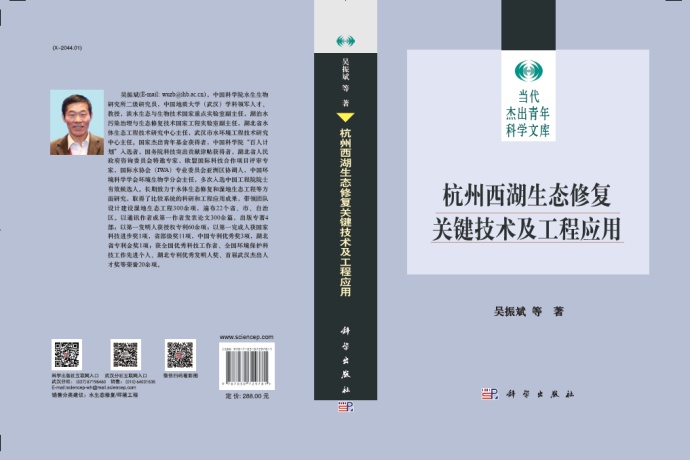
Newsroom
Book Published: Key Technologies and Engineering Applications of Ecological Restoration in Hangzhou West Lake, China

The book cover (Credit: IHB)
"Key Technologies and Engineering Applications of Ecological Restoration of West Lake in Hangzhou, China," authored by Wu Zhenbin, a professor in Institute of Hydrobiology, Chinese Academy of Sciences, has been published by Science Press.
The book is a summary of the research team led by Institute of Hydrobiology, Chinese Academy of Sciences in the West Lake ecological restoration theory research, key technology development and engineering applications in more than 10 years. Since 2008, with the backing of various national scientific projects: the 11th Five-Year Plan "Typical Southern Urban Landscape Lake Water Quality Improvement and Aquatic Vegetation Construction Technology" (2009ZX07106-2), the 12th Five-Year Plan "Urban Landscape Lake Water Environment Improvement Technology Research and Engineering Demonstration" (2012ZX0710100705), the Key project of National Natural Science Foundation "Study on the Molecular Mechanism of Phytoallelopathy Inhibiting Harmful Algae Growth" (31830013), and the Key Deployment and STS projects of the Chinese Academy of Sciences, the team navigated three successive Five-Year Plans, capitalized on their team's strengths, fostering collaboration and overcoming numerous challenges. Breakthroughs have been made in endogenous pollution control, improvement of the bottom quality of "aromatic ash " sediment, control of abnormal proliferation of growing algae, recovery of submerged plants and steady-state regulation. Across the lake's 6.5 km2 surface area, 1.86 km2 has been restored with submerged plants, creating an "underwater forest" landscape and naturally sustaining submerged plant communities for over a decade. This has improved water self-purification and bolstered the lake's ecological and aesthetic value, yielding substantial social, economic, and environmental benefits.
The team's groundbreaking research and engineering achievements were widely recognized, earning acknowledgment from local authorities, the public, tourists, and the administration office of national major scientific and technological projects for water pollution control and treatment. They have been hailed as landmark accomplishments in lake restoration projects. It has contributed to the successful inclusion of the West Lake in the World Cultural Heritage List, the water environment protection and water landscape beautification of the 19th Asian Games and the 11th G20 Summit.
Over the past 16 years, more than ten scientific research institutions and their teams of about 200 researchers have participated in the West Lake scientific research work. Led by Professor Wu Zhenbin is responsible for the West Lake research team and the main research projects, and the three five-year plans are roughly led by He Feng, Liu Biyun and Zhang Yi. According to the incomplete statistics of the travel reimbursement of the Purification and restoration ecology group of the Institute of Hydrology, 158 individuals spent a collective 19,000 days at West Lake, sampling and analyzing. Of these, 55 persons were more than 50 days, 35 persons were over 100 days, 11 persons exceeded 500 days, and 3 persons dedicated more than 1,300 days.
More than 60 master's and doctoral dissertations and post-doctoral reports have been carried out on West Lake as Research objects. A total of 46 postdocs and postgraduates have been trained, and more than 150 related research results have been published in Water Research. Chemical Engineering Journal and other well-known academic journals in the field of ecological environment, and have authorized more tha
The book is divided into eight chapters, covering the main water environment problems of the West Lake, the study and control of nutrient salt flux into the lake, the study and control of endogenous pollution load, the living algae and its control, the optimization and stabilization of aquatic plant community, the application of water ecological restoration engineering and ecological environmental effects, a total of about 730,000 words, including 427 figures, 167 tables, and 66 appendix color illustrations.
Due to the limitation of space, the book does not directly cover other work such as water transfer and nitrogen reduction in the West Lake, but mainly focuses on the related research results of the restoration mechanism of submerged plants and the reconstruction of submerged vegetation, which is mainly the content of the Purification and Restoration Ecology Research Group in the Institute of Hydrobiology.
Written primarily by staff, postdocs, and students of the research group, along with key contributors from the West Lake project, the authors include Zhenbin Wu, Yi Zhang, Biyun Liu, Feng He, Qiaohong Zhou, Jianmin Ma, Jincheng Zuo, Jin Li, Shibin Xia, Dong Xu, Zhiying Wu, Enrong Xiao, Zisen Liu, Tao Li, Junmei Wu, Liping Zhang, Dongru Qiu, and over 40 others. Yi Zhang, Biyun Liu, and Qiaohong Zhou were responsible for individual chapters, with Yi Zhang assisting in drafting, and Zisen Liu handling related logistics.
The West Lake research work was carried out under the leadership of Academician Zhao Jindong, former director of the Institute of Hydrology. As the head of the water special common project, he coordinated and guided the main links of the West Lake project, including project establishment, implementation and summary.Leaders and colleagues at the Institute of Hydrobiology have been instrumental in nurturing the West Lake project, providing crucial assistance and encouragement. More than ten cooperative units and teams cooperate sincerely and support each other in the work of West Lake. The local government, particularly the West Lake Waters Management Office, offering substantial backing and multifaceted assistance. In the process of West Lake work, thanks to Zhang Quanxing, Hou Lian, Zhang Shi, Kuang Tingyun and other famous experts to visit the guidance, Chinese Academy of Engineering Yang Zhifeng Academician and Wu Fengchang Academician for the book preface. During the research process, guidance was generously provided by distinguished experts including Academicians Tingyun Kuang, Quanxing Zhang, Lian Hou, Shi Zhang, Yanxin Wang, and others. Academicians Zhifeng Yang and Fengchang Wu of the Chinese Academy of Engineering wrote the foreword for the book.